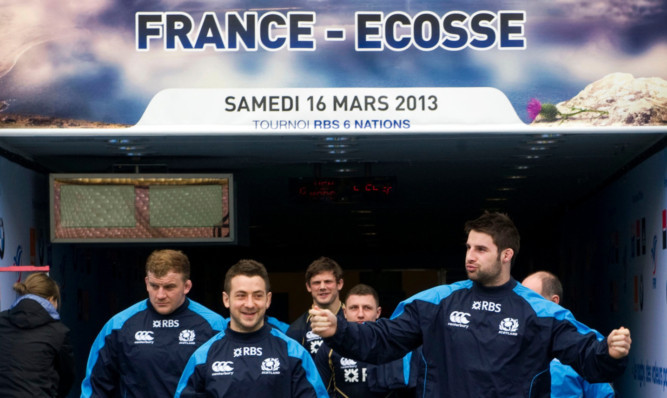Scotland’s team and coaches will deliver the most relevant judgment on their RBS Six Nations performance no matter what the result in tonight’s final act in the Stade de France, believes skipper Kelly Brown.
To end on a winning note, the Scots have to overturn history. They have only ever won at the massive stadium in the northern Parisian suburb of St Denis on their first visit, back in 1999, when five Scottish tries in the space of 25 first-half minutes had the whistles raining down from the stands.
That was on an April day in glorious sunshine, but this year snow is still lying in the shaded areas of the City of Lights and it’s expected to be freezing and wet as the 2013 Six Nations is wound up between two sides which have experienced entirely different championships to that expected.
Pre-championship favourites France face a wooden spoon and their worst performance in the championship since they gained only a draw out of four games in 1969, the year Jim Telfer’s famous try produced one of Scotland’s rare Parisian wins.
Scotland, meanwhile, can still finish with a positive record in the Six Nations for the first time since 2006, but Brown thinks that the underlying trends are more positive than the results.
“If you look at the whole championship, I feel that we have made really big strides, but it’s about constantly improving.
“We know as a side what we are trying to do. I feel that over the course of the championship we have shown that we are moving forward in a lot of areas, and we will judge ourselves as a squad.”
The Scots have not got carried away with their back-to-back wins, but it was a significant marker, believes the skipper.
“There is no doubt that winning back-to-back matches was a big thing for us,” he said. “We are by no means the finished article but I and the coaches have seen steady improvement as we have gone through.”
The coaching team have been a good blend, he added, even if they are likely to break up even if Scott Johnson gets the nod to continue as head coach.
“Scott’s been great to work with and as we know he brings a bit of humour and has a turn of phrase, but he’s very honest in telling us exactly what he thinks and where we have to improve,” continued Brown.
“What happens with Dean (Ryan) is up to him. He said he was only here for the Six Nations so we just have to wait and see. I think they’ve given the Scottish fans something to shout and cheer about.”
Scotland fully expect France to lash out in their anger at what has happened in this championship, in the knowledge that this could result in entirely opposite results.
“Without a shadow of a doubt, they are upset and angry,” said Brown. “I’m sure we are in for an incredibly intense Test match. But everyone is aware that when you play in France the French crowd will be absolutely screaming for their side.
“If we can put them under a bit of pressure then every now and again the crowd can turn against pretty quickly.”
France do generally allow teams to play more in space but this current squad are difficult to assess because of their troubled championship, in which some players, like No 8 Louis Picamoles, have been inspired, but others have disappointed.
Pressure is building on Philippe St Andre, who inherited a divided team that somehow reached the World Cup final, and has struggled to improve them. His persistent loyalty to the mercurial Freddie Michalak is just the most outlandish of his moves increasingly questioned by the analytical French media and fans.
Given a fair crack of the whip at the set-piece this week by a referee far more sympathetic to the flow of the game in Wales’ Nigel Owens, this could represent Scotland’s best chance for a rare Paris win.
That, added to the two victories over Italy and Ireland, could only produce a positive assessment of Scotland’s Six Nations season.
For more Six Nations build-up, see Saturday’s Courier.
